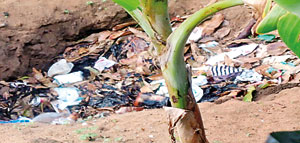Letters to the Editor
View(s):Look beyond fumigation and burning garbage to tackle dengue menace
It was reported that from the beginning of July, thousands of soldiers, airmen and sailors have supported the Public Health Inspectors (PHIs) in a house-to-house campaign to identify mosquito breeding areas and take corrective measures.
 I live in Kochchikade (Negombo) and, alas, I have hardly seen attempts to identify mosquito breeding places in my area- no officials have visited my or neighbouring premises, although there were many people in the area affected by dengue. Somebody said households would be inspected on July 12 and if a mosquito breeding place was found, the owners of the premises would be liable to a fine of Rs. 50.000,000. No officials turned up but, everybody tried to clean their surroundings by lighting massive fires and burning all accumulated rubbish, plastic items included.
I live in Kochchikade (Negombo) and, alas, I have hardly seen attempts to identify mosquito breeding places in my area- no officials have visited my or neighbouring premises, although there were many people in the area affected by dengue. Somebody said households would be inspected on July 12 and if a mosquito breeding place was found, the owners of the premises would be liable to a fine of Rs. 50.000,000. No officials turned up but, everybody tried to clean their surroundings by lighting massive fires and burning all accumulated rubbish, plastic items included.
A couple of days later, there was a thundering sound and from a cloud of smoke, like in one of those Doomsday films (Apocalypse now), appeared a ghastly figure with a mask and a menacing looking fogging device. I was told to go inside my house and close the door. I obeyed but later on I wanted to find out whether that fogging had any effect on the mosquito population. Half an hour later, around six p.m., the first mosquitoes flew into the house and I managed to kill them with an electric mosquito swatter. Next morning, as I usually sleep with an open window under a mosquito net, I found and killed some 30 more of them.
 The Daily Mail of September, 2016
The Daily Mail of September, 2016
There is data which suggests that mosquitoes have become resistant to the chemicals used in fumigation and may not die. Furthermore, fogging kills other insects that feed on mosquitoes. Dengue has to be controlled at the larval stage. It is commendable that the Sri Lankan government decided to seek foreign help in fight against dengue and is ready to introduce a new method to rein in dengue.
Many Sri Lankans, believe that burning rubbish, including plastics, can deter mosquitoes. This is an illusion and therefore, the media, governmental bodies, schools and other public institutions should educate people about the menace of burning plastic items in their gardens. It is indisputably proven that burning plastics emits carcinogenic, toxic smoke and causes Chronic Obstructive Pulmonary Disease and sometimes cancer.
S. Mack
Via email
Engineers’ protest against new power plan lacks professionalism
In a letter to the Minister of Power and Renewable Energy Ranjith Siyambalapitiya on July 27, the Ceylon Electricity Board (CEB) Engineers’ Union (EU) has demanded the urgent intervention of the minister to get the CEB to facilitate the unhindered procurement of future power plants as per its Least Cost Long Term Generation Expansion Plan (LCLTGEP). Extracts of this letter were published in the media, in a press article, which reported that the Ceylon Electricity Board (CEB) Engineers’ Union (EU) allegedly levelled several allegations against the Public Utilities Commission of Sri Lanka (PUCSL) in respect of its decision to reject the CEB’s Long Term Generation Expansion (LTGE) Plan and recommending an alternative Plan comprising natural gas operated power plants in place of coal power plants as proposed by the CEB.
Among these allegations are:
1. PUCSL lacks people of proven calibre who will function objectively and in a professional manner.
2. PUCSL has no discretionary powers to amend the submitted plan on its own.
3. PUCSL’s action in approving the LCLTGEP 2018-2037 of the CEB is totally unsatisfactory.
The concerns raised by CEB in the said letter, that PUCSL is not staffed by “people of proven calibre who will function objectively and in a professional manner”, is a matter of dispute taking into consideration the fact that the recommendation made by the PUSCL, balances the health and safety of the very people whose energy demands are being met with the LCLTGEP 2018-2037. This decision boasts of the holistic approach by the PUCSL as opposed to the short sighted approach of this concentrated group of highly respected professionals making these allegations. Further to this, the CEBEU states that they “had no other option but to resort to trade union action to safeguard their membership and the sector from such individuals”.
One wonders why the CEBEU as a trade union feels their membership will get affected when decisions are being made to humanize the issue and for the betterment of the community as a whole?
It is accepted that professionals express an opinion supported by scientific facts and giving sound reasoning in rejecting and/or accepting the opinion of another. Therefore one would expect the CEBEU to also reveal as to why they reject this decision of the PUCSL, without resorting to levelling allegations against a parallel public institution in what reeks strongly of prejudice.
The press release claims that the PUCSL has not acted according to the provisions in the Electricity Acts. But the fact is that it is the CEB who has violated the provisions in the Electricity Act in preparing its LTGE Plan. The Amended Electricity Act No. 31 of 2013 says “For the purpose of this section- “Least Cost Long Term Generation Expansion Plan” means a plan prepared by the transmission licensee and amended and approved by the Commission on the basis of the submissions made by the licensees and published by the Commission, indicating the future electricity generating capacity requirements determined on the basis of least economic cost”.
The CEB’s LTGE Plan has been prepared based on the cost of production incorporating the amortized capital cost, operation and maintenance costs and fuel cost only. There is no economic component taken into account, obviously because being engineers, CEB staff may not have any knowledge of economics to prepare a Plan based on least “economic” cost. Hence, before protesting against the PUCSL Plan, the least the CEB EU could do at this stage is to consult an economist and find out how to include “economic” cost into their equation. Since the draft Plan submitted by CEB to the PUCSL does not conform to the country’s law as it is not based on least “economic” cost, it is not legal and no one can enforce it.
The bottom line is that when the economic component is added, the least cost option shifts from coal power to gas power. If the CEBEU opposes to gas power for future generation for whatever the reasons, they should come out with it giving valid reasons as professionals, without threatening to strike.
Environmental Foundation Limited and the Energy Experts Team
Postage Stamp for the late
A.R. Munsoor
A.R.Munsoor, who was elected to Parliament by the people of Kalmunai dedicated his life towards national unity, peace and progress. He believed in reconciliation and worked towards unity between the Muslims and Tamils of the East.
He is also the architect of the modern Kalmunai Town, which boasts of many modern buildings. He was a senior lawyer and held many important ministerial portfolios during his time as a Parliamentarian.
I am appealing to the Minister of Posts to direct the Philatelic Bureau to issue a commemorative stamp in recognition of the great services rendered by MP A.R. Munsoor for over 50 years in public life.
A.H.M. Azwer
Via email


